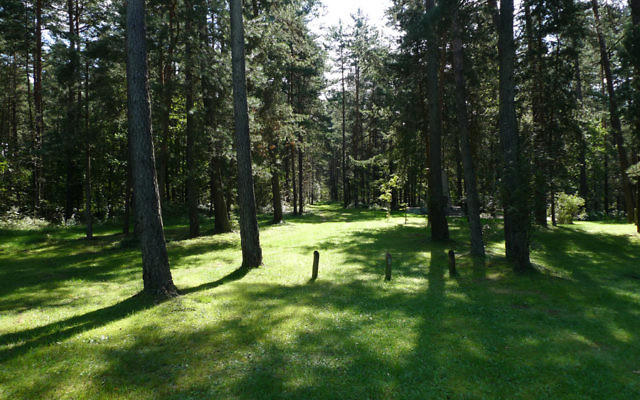Tunnel dug with spoons by Jewish prisoners found in Lithuania
Researchers from all over the world used scanning technology to map out the path of the 112ft -long tunnel
An international research team has pinpointed the location of a legendary tunnel that Jewish prisoners secretly dug out withspoons to try to escape their Nazi captors during the Second World War.
The tunnel, located in the Ponar forest which is now known as Paneriai, outside of the Lithuanian capital Vilnius, is the site where some 100,000 people, including 70,000 Jews, were killed and thrown into pits during Nazi occupation.
In the quest to find the tunnel, the team of archaeologists, geophysicists and Jewish historians from Israel, the United States, Canada and Lithuania did not want to disturb any human remains in the mass burial pits at the site.
So the researchers used scanning technology called electrical resistivity tomography – the same kind used in mineral and oil exploration – to map out the path of the 112ft -long tunnel.
“To find a little glimmer of hope within the dark hole of Ponar is very important as humans,” Jon Seligman, an archaeologist with the Israel Antiquities Authority, said.
“The tunnel shows that even when the time was so black, there was yearning for life within that,” he added.
Towards the end of the war, the Nazis sought to erase the evidence of their mass killings. Jewish and Soviet prisoners were brought to the Ponar forest from Stutthof concentration camp and, with their legs chained, they were forced to dig up the mass graves, collect bodies and burn them.
The prisoners were dubbed the Burning Brigade and they lived in fear that once their task was complete, they too would be killed.
According to accounts, one prisoner, Isaac Dogim, was piling decomposed corpses when he recognised members of his own family, including his wife. He identified her by the medallion he had given her for their wedding.
He is credited with organising the escape.
At night, the prisoners were held in one of the pits used in the killings. For three months, some of the prisoners secretly dug an underground tunnel to escape.
Then on April 15, 1944, in the middle of the night, 40 prisoners filed off their chains and fled through the narrow tunnel. Guards quickly discovered them and many were shot, but 11 prisoners managed to escape to the forest, reach partisan forces and survive the war.
“It is a very important discovery, because this is another proof of resistance of those who were about to die,” said Markas Zingeris, director of the Vilna Gaon Jewish State Museum in Vilnius.
A Lithuanian archaeologist discovered the tunnel entrance in 2004, and the museum called on the research team to search for the entire tunnel. The team traced the length of the tunnel and found the tunnel exit.
Last year, the same research team used ground penetrating radar to discover parts of the old Great Synagogue of Vilna, which was demolished by Soviet authorities after the war. The team is now excavating at the site to uncover the history of Jewish life in Vilnius.

Thank you for helping to make Jewish News the leading source of news and opinion for the UK Jewish community. Today we're asking for your invaluable help to continue putting our community first in everything we do.
For as little as £5 a month you can help sustain the vital work we do in celebrating and standing up for Jewish life in Britain.
Jewish News holds our community together and keeps us connected. Like a synagogue, it’s where people turn to feel part of something bigger. It also proudly shows the rest of Britain the vibrancy and rich culture of modern Jewish life.
You can make a quick and easy one-off or monthly contribution of £5, £10, £20 or any other sum you’re comfortable with.
100% of your donation will help us continue celebrating our community, in all its dynamic diversity...
Engaging
Being a community platform means so much more than producing a newspaper and website. One of our proudest roles is media partnering with our invaluable charities to amplify the outstanding work they do to help us all.
Celebrating
There’s no shortage of oys in the world but Jewish News takes every opportunity to celebrate the joys too, through projects like Night of Heroes, 40 Under 40 and other compelling countdowns that make the community kvell with pride.
Pioneering
In the first collaboration between media outlets from different faiths, Jewish News worked with British Muslim TV and Church Times to produce a list of young activists leading the way on interfaith understanding.
Campaigning
Royal Mail issued a stamp honouring Holocaust hero Sir Nicholas Winton after a Jewish News campaign attracted more than 100,000 backers. Jewish Newsalso produces special editions of the paper highlighting pressing issues including mental health and Holocaust remembrance.
Easy access
In an age when news is readily accessible, Jewish News provides high-quality content free online and offline, removing any financial barriers to connecting people.
Voice of our community to wider society
The Jewish News team regularly appears on TV, radio and on the pages of the national press to comment on stories about the Jewish community. Easy access to the paper on the streets of London also means Jewish News provides an invaluable window into the community for the country at large.
We hope you agree all this is worth preserving.






















